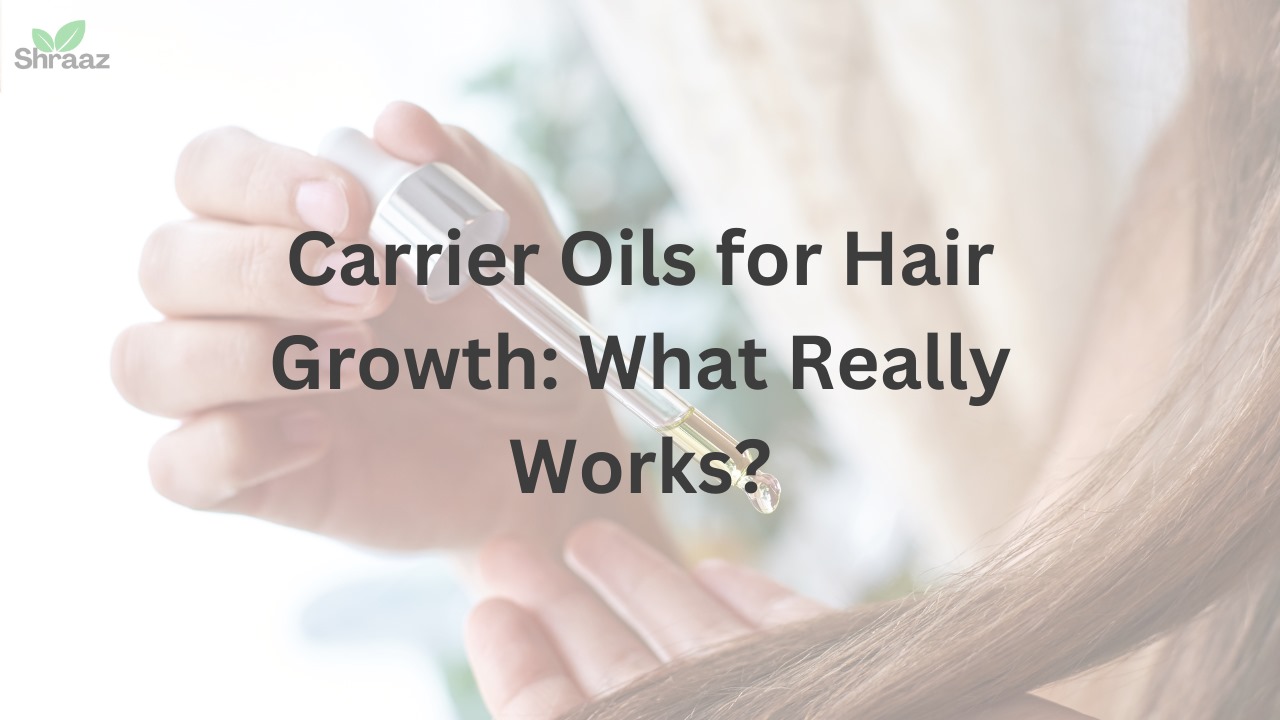Introduction
Hair growth is a concern for many, leading to a growing interest in natural remedies. Among these, carrier oils have gained significant attention for their ability to promote hair health and growth. Carrier oils are used not only for their moisturizing properties but also for their role in strengthening hair follicles and reducing hair loss. But which oils really work? In this in-depth article, we’ll explore the science behind the most effective carrier oils for hair growth, their benefits, application methods, and more.
For a broader discussion of the overall Natural oils beyond just carrier oils, check out our Complete Beginner’s Guide to Using Natural Oils.
Understanding Carrier Oils
Carrier oils are derived from the fatty portions of plants, typically from seeds, nuts, or kernels. These oils are named “carrier” because they are used to dilute essential oils and “carry” them to the skin without irritating them. Unlike essential oils, carrier oils are safe to apply directly to the skin and scalp, making them a cornerstone in natural hair care.
Key Features of Carrier Oils:
- Non-Volatile: Unlike essential oils, carrier oils are not volatile and do not evaporate when exposed to air.
- Nourishing: Carrier oils are rich in vitamins, fatty acids, and antioxidants, making them highly beneficial for skin and hair health.
- Moisturizing: They are excellent at sealing moisture into the hair shaft and preventing dryness.
- Scalp Health: By reducing inflammation and balancing oil production, they contribute to overall scalp health, which is crucial for hair growth.
Popular Carrier Oils in Hair Care
| Carrier Oil | Key Nutrients | Best For |
| Coconut Oil | Lauric acid, Vitamin E, Fatty acids | Damaged, dry, and brittle hair |
| Argan Oil | Vitamin E, Oleic acid, Antioxidants | Frizzy, damaged, and dry hair |
| Jojoba Oil | Vitamin B, E, Zinc | Oily scalp, thin hair |
| Castor Oil | Ricinoleic acid, Omega-6 fatty acids | Thinning hair, promoting growth |
| Sweet Almond Oil | Magnesium, Omega-9 fatty acids | Weak, damaged hair |
| Avocado Oil | Biotin, Oleic acid, Monounsaturated fats | Brittle, damaged hair |
| Grapeseed Oil | Linoleic acid, Antioxidants | Oily scalp, thin hair |
How Carrier Oils Help Hair
Carrier oils work in a variety of ways to support hair health:
- Moisturization: They lock in moisture and prevent hair from becoming dry and brittle.
- Strengthening: The fatty acids and vitamins in carrier oils nourish the hair shaft, leading to stronger hair with less breakage.
- Scalp Health: By maintaining a balanced scalp, carrier oils prevent issues like dandruff, which can impede hair growth.
- Stimulation of Hair Growth: Some oils, such as castor oil, are known to stimulate hair follicles, promoting faster and thicker growth.
Hair Growth Cycle: How Carrier Oils Impact It
To understand how carrier oils can enhance hair growth, it’s crucial to first grasp the hair growth cycle. Human hair follows a cyclical growth pattern divided into four main stages:
1. Anagen (Growth Phase)
This is the most critical phase for hair growth. During anagen, the hair follicle is actively producing hair, and growth can last between 2 to 7 years depending on genetics and overall health. Healthy anagen phases are key to long, thick hair.
2. Catagen (Transition Phase)
This short phase, lasting only 1-2 weeks, marks the end of active growth. The hair follicle shrinks, and the hair detaches from the dermal papilla, the base of the follicle that supplies it with nutrients.
3. Telogen (Resting Phase)
In this phase, the hair follicle is dormant, and no growth occurs. This phase lasts around 3 months, and about 10-15% of all hairs are in this phase at any given time.
4. Exogen (Shedding Phase)
During exogen, old hair sheds and new hair begins to grow from the same follicle, marking the start of a new anagen phase.
How Carrier Oils Influence the Hair Growth Cycle
- Anagen Phase Support: Carrier oils rich in vitamins, fatty acids, and antioxidants can help prolong the anagen phase, encouraging longer and stronger hair growth.
- Scalp Stimulation: Oils like castor oil and peppermint oil, when massaged into the scalp, can stimulate blood circulation and rejuvenate hair follicles, accelerating growth.
- Preventing Hair Loss: Carrier oils, by nourishing hair follicles and maintaining scalp health, can reduce hair thinning and shedding during the telogen phase.
Scientific Studies on Hair Growth
Studies have shown that certain oils can prolong the anagen phase and improve overall hair thickness. For example, a 2003 study published in the Journal of Cosmetic Science found that coconut oil significantly reduces protein loss in both damaged and undamaged hair, improving its overall health. Another study demonstrated the efficacy of jojoba oil in maintaining scalp health and promoting growth due to its similarity to human sebum.
| Hair Growth Cycle Stage | Carrier Oils That Help | Benefits |
| Anagen (Growth) | Coconut oil, Castor oil | Strengthens hair, extends growth phase |
| Catagen (Transition) | Argan oil, Grapeseed oil | Prevents breakage, retains hair |
| Telogen (Resting) | Jojoba oil, Sweet Almond oil | Maintains scalp health |
| Exogen (Shedding) | Castor oil, Avocado oil | Promotes regrowth, reduces shedding |
Top Carrier Oils for Hair Growth: Detailed Breakdown
Let’s delve into the most effective carrier oils for hair growth, exploring their specific benefits, scientific backing, and how they contribute to healthier, stronger hair.
1. Coconut Oil
Coconut oil is one of the most popular carrier oils for hair, and for good reason. It contains lauric acid, a fatty acid that has a high affinity for hair proteins and can penetrate the hair shaft, preventing protein loss and damage. Coconut oil is ideal for people with damaged or brittle hair due to its ability to moisturize deeply and protect the hair from further harm.
- Key Nutrients: Lauric acid, Vitamin E, antioxidants.
- Best For: Damaged, dry, brittle hair.
- Application: Use as a pre-shampoo treatment or overnight mask for deep hydration.
2. Argan Oil
Argan oil is known as “liquid gold” for its rich composition of antioxidants, essential fatty acids, and Vitamin E. It is highly beneficial for dry, frizzy hair and protects against environmental damage and heat styling.
- Key Nutrients: Vitamin E, oleic acid, antioxidants.
- Best For: Dry, frizzy, color-treated hair.
- Application: Use as a leave-in conditioner or mix with your regular conditioner for added shine.
3. Jojoba Oil
Jojoba oil is highly compatible with the scalp’s natural oils, making it an excellent choice for people with oily scalps or dandruff. It moisturizes the scalp without clogging pores and helps regulate sebum production, which can prevent hair loss.
- Key Nutrients: Vitamins B, E, zinc.
- Best For: Oily scalp, dandruff, thin hair.
- Application: Apply as a scalp massage oil or use as a lightweight serum.
4. Castor Oil
Castor oil is rich in ricinoleic acid, which improves blood circulation to the scalp and encourages the growth of thicker, stronger hair. It’s also known for its anti-inflammatory properties, making it suitable for those suffering from scalp irritation.
- Key Nutrients: Ricinoleic acid, omega-6 fatty acids.
- Best For: Thinning hair, promoting rapid growth.
- Application: Apply directly to the scalp, often mixed with lighter oils like coconut or almond oil.
5. Sweet Almond Oil
Almond oil is packed with vitamins and minerals that help strengthen hair and prevent breakage. Its lightweight nature makes it suitable for all hair types.
- Key Nutrients: Magnesium, phospholipids, Vitamin E.
- Best For: Weak, damaged hair prone to breakage.
- Application: Use as a hot oil treatment or mix with hair masks for added nourishment.
6. Avocado Oil
Avocado oil is a powerhouse of nutrients that deeply penetrates the hair shaft. It is rich in monounsaturated fats, biotin, and oleic acid, all of which promote hair growth and improve hair health. Its moisturizing properties make it especially beneficial for dry or chemically treated hair.
- Key Nutrients: Biotin, oleic acid, monounsaturated fats.
- Best For: Brittle, dry, or chemically treated hair.
- Application: Can be used in hot oil treatments or as a leave-in conditioner for enhanced moisture.
7. Grapeseed Oil
Grapeseed oil is a lightweight oil that is high in linoleic acid, which is beneficial for hair health. It can help prevent hair loss by promoting blood circulation to the scalp and is excellent for those with oily hair due to its non-greasy texture.
- Key Nutrients: Linoleic acid, antioxidants.
- Best For: Oily scalp, thinning hair.
- Application: Use as a daily leave-in conditioner or mix with other carrier oils for added benefits.
How to Use Carrier Oils for Maximum Hair Growth Benefits
Using carrier oils effectively can enhance their benefits for hair growth. Here are some tips and methods for incorporating them into your hair care routine:
Application Methods:
- Scalp Massage:
- Apply a few drops of your chosen carrier oil directly to your scalp.
- Massage gently for 5-10 minutes to improve blood circulation and promote absorption.
- Recommended oils: Jojoba, castor, or coconut oil.
- Hot Oil Treatment:
- Heat your chosen oil (like coconut or avocado) until warm, not hot.
- Apply it to your hair, focusing on the ends.
- Cover your hair with a shower cap and leave it on for 30 minutes or overnight.
- Rinse thoroughly.
- Pre-Shampoo Treatment:
- Apply your carrier oil to dry hair before shampooing.
- Leave it on for at least 30 minutes to nourish and protect hair during washing.
- Leave-In Conditioner:
- Mix a few drops of carrier oil with your regular conditioner or use it alone as a leave-in treatment to keep hair hydrated throughout the day.
- DIY Oil Blends:
- Create customized blends by combining various carrier oils for enhanced benefits. For instance, mix castor oil with coconut oil for growth stimulation and moisture.
Recommended Frequency of Use:
- Dry or Damaged Hair: 2-3 times a week for deep conditioning and repair.
- Oily Hair: Once a week to prevent greasiness while still providing nourishment.
- Healthy Hair: Once a week for maintenance and hydration.
DIY Carrier Oil Blends for Hair Growth
| Blend Name | Ingredients | Benefits |
| Growth Booster | Castor oil + coconut oil | Stimulates growth, moisturizes, and prevents breakage |
| Hydration Boost | Avocado oil + sweet almond oil | Deeply hydrates and strengthens hair |
| Shine Enhancer | Argan oil + jojoba oil | Adds shine and reduces frizz |
| Scalp Soother | Grapeseed oil + peppermint essential oil | Soothes scalp irritation, promotes circulation |
Scientific Backing: What the Research Says
The effectiveness of carrier oils for hair growth is supported by a growing body of scientific research. Here are some key findings:
Coconut Oil
A study published in the Journal of Cosmetic Science in 2003 demonstrated that coconut oil significantly reduces protein loss in hair. This protective effect is particularly beneficial for damaged hair, as it prevents further breakage and encourages healthy growth.
Castor Oil
A 2017 study published in the Journal of Ethnopharmacology highlighted the hair growth-promoting properties of ricinoleic acid, the primary fatty acid in castor oil. The study indicated that regular application of castor oil could enhance hair growth and improve thickness due to its ability to increase blood circulation in the scalp.
Jojoba Oil
Research published in The International Journal of Cosmetic Science has shown that jojoba oil can effectively mimic human sebum. This similarity allows it to moisturize without clogging pores, making it beneficial for both hair and scalp health.
Argan Oil
A 2015 study found that argan oil, rich in antioxidants and fatty acids, not only hydrates hair but also protects it from oxidative damage caused by environmental stressors. This protection can contribute to healthier hair and promote growth.
Other Oils
Various studies indicate that the essential fatty acids in oils like avocado and grapeseed can improve scalp health and promote stronger hair growth. The antioxidant properties in these oils also help combat oxidative stress, which can lead to hair loss.
Carrier Oils to Avoid for Hair Growth
While many carrier oils are beneficial for hair growth, some should be avoided due to their potential negative effects.
1. Mineral Oil
Mineral oil is a byproduct of petroleum and may create a barrier that prevents moisture from entering the hair. It can also clog pores on the scalp, leading to irritation and hair loss.
2. Wheat Germ Oil
Although rich in nutrients, wheat germ oil is highly comedogenic, meaning it can clog pores and lead to scalp issues. This can inhibit hair growth and may not be suitable for all hair types.
3. Olive Oil
While olive oil has moisturizing properties, it is relatively heavy and may not work well for all hair types, particularly fine hair. It can weigh hair down, leading to limpness and reduced volume.
4. Sesame Oil
Although used traditionally in some cultures, sesame oil can be comedogenic for some individuals, potentially leading to blocked follicles and hair thinning.
Other Factors to Consider for Hair Growth
While carrier oils can significantly enhance hair growth, several other factors also play a crucial role in achieving optimal hair health:
Diet and Nutrition
- Essential Nutrients: Hair growth requires a balanced intake of proteins, vitamins, and minerals. Nutrients like biotin, zinc, and iron are vital for hair health. Foods rich in these nutrients include eggs, nuts, leafy greens, and fish.
- Hydration: Staying hydrated is essential for overall health, including hair health. Adequate water intake can improve circulation and promote nutrient absorption.
Lifestyle Factors
- Stress Management: High-stress levels can lead to hair loss. Incorporating stress-reduction techniques such as yoga, meditation, and regular exercise can help maintain healthy hair growth.
- Sleep: Quality sleep is vital for recovery and growth. Aim for 7-9 hours of uninterrupted sleep to support overall health.
Consistency and Patience
Results from using carrier oils may take time. Regular application combined with a healthy lifestyle can significantly enhance results. It is essential to be consistent with your hair care routine and allow several weeks or months to notice significant changes.
Conclusion
Carrier oils are a powerful ally in the pursuit of healthy hair growth. With their rich nutritional profiles and beneficial properties, oils like coconut, castor, and argan can nourish the scalp, strengthen hair, and stimulate growth. By understanding how to use these oils effectively and incorporating other healthy practices into your routine, you can achieve fuller, healthier hair over time. While each individual may respond differently, experimenting with these oils can lead to personalized solutions that cater to your specific hair needs. Embrace the natural path to hair health and enjoy the journey of discovering what truly works for you!




